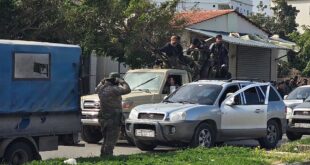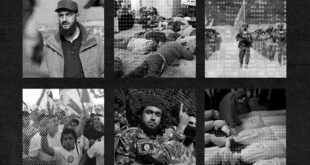Geostrat: Terrorists throughout the world are made. Since Jordan has borders with Syria and Iraq amidst a turbulent region, many Jordanians due to economic hardships and political dismay have resorted to initiate a caliphate in Iraq and in Syria in cooperation with many extremists and terrorists who stormed both countries throughout the past 19 years.
In view of the threats posed by terrorism to Jordan, especially with the presence of a large number of Jordanian fighters in Syria and Iraq, some studies estimate the number of Jordanian fighters who have joined Daesh group in Syria, Iraq, Libya, and some other countries since 2011 about four thousand fighters. The possibility of these or some of them to return to Jordan poses a major challenge and a dilemma for Jordan as they will transfer their military expertise to others who oppose the regime in order to combat the Jordanian security and armed forces.
To overcome this dilemma, the state has amended the anti-terrorism law, criminalized membership to any terrorist group including Al-Nusra and Daesh amongst others by any means, including social media. The law also allowed for stronger supervision of mosques and religious discourse.
Since 2014, the National Policy Council and its specialized committees have launched a wide-ranging campaign at all levels ministries (Ministry of Interior, Ministry of Culture, Ministry of Awqaf and Religious Affairs, Ministry of Social Development, Ministry of Foreign Affairs and Ministry of Education) and Security apparatus. The violent extremism resulted in the production of the National Strategy for the Elimination of Violent Extremism in 2014. Its details were published in the Jordanian local newspapers in 2016 under the name of the National Plan to Counter Extremism. The government set up a committee to combat extremism, which established a frame of reference consisting of three main axes: the religious cultural axis, the democratic axis and the human rights axis.
The religious cultural axis emphasizes the need to support and promote an authentic Islamic religious culture based on the real principles of Islamic Shari’ah, which came to preserve the five basic objectives of living. This is what fundamentalists call the total goals that religion has come to realize: to preserve people’s religions, their lives, their minds, their descendants and their source of living).
As for the democratic axis, the absence of democracy often leads to a flourishing culture of violence and extremism in various forms. Hence, the strategy called for the promotion of democratic values such as freedom, justice, equality, respect for religions and protection of minorities and renunciation of religious and sectarian extremism. On the human rights axis, the strategy called for the consolidation of the values of tolerance and pluralism and the culture of respect for human rights and the acceptance of the other through the institutions of guidance and education such as the Ministry of Education, the Ministry of Higher Education and Scientific Research, the Ministry of Awqaf and Islamic Affairs and so forth.
Since its publication in the local media, the strategy has generated much discussion and wide-ranging positive reactions, regarded as a participatory strategy where efforts of all official and non-official institutions are united including the negative criticism of the substance of the strategy and the distribution of roles among the actors, and poor coordination between the partners in the strategy.
Rehabilitation of Terrorists means assisting terrorists or terrorist suspects in prisons who have been detained or imprisoned at government centers to return to normal life by providing them with education, training, treatment and subsequent care, which can contribute to their reintegration into their community.
It is therefore important for world peace to rehabilitate detainees and prisoners affected by violent extremist religious ideology, to prevent extremism and to facilitate their return to society.
The “rehabilitation of extremists and terrorists” is completely different from the rehabilitation of criminals. This is the appropriate answer to the two most important challenges facing contemporary world in combating terrorism and violent extremism. The first is that terrorist groups such as Daesh, Boko Haram, Al-Qaeda and its affiliated groups specifically target Muslim communities. Therefore, there is an urgent need to rehabilitate those ideologically and theologically exposed to the influence of these terrorist groups. Secondly, the conditions in prisons and contemporary detention centers and their role in preventing violent extremism or radicalization are deemed very important.
Thus, the Jordanian security focuses on five major components which shape a terrorist and a radical: the hub, the ideological group, social support, individual susceptibility to violent extremism and individual motivation.
In Jordan, attention to freedoms, human security and the protection of human rights coincided with the revolution of interest in the issues of freedom, human rights and human security imposed by the process of globalization since the late 1980s and became a permanent part of contemporary international law and the culture of human rights.
Therefore, the philosophy of reform and rehabilitation of prisoners and detainees in all its forms is a precedent in terms of dealing with those accused of violent extremism and terrorism. In Jordan, Management of Rehabilitation and Rehabilitation Centers, (the name currently being given to prisons in Jordan), which became directly and technically responsible for its rehabilitation and rehabilitation centers, was established in January 1, 1986. Prior to that, it was called as the reform and rehabilitation centers. There was also an office concerned with prisons and concerned only about technical aspects. The prisons have been administered by police departments (the public security) and have been under their jurisdiction.
The concept of prisons is no longer used after 1986, but rather reform and rehabilitation centers; it is a more humane concept and comes from the concept of passive prisons, which is a positive measure for the Jordanian state.
The reform and rehabilitation centers adopted the philosophy of reform and rehabilitation as a method and a goal instead of the theory of punishment and illiteracy in old prisons, in line with the global trend towards the protection and preservation of human rights as rehabilitation and rehabilitation centers have a prominent role in this field
 Geostrategic Media Political Commentary, Analysis, Security, Defense
Geostrategic Media Political Commentary, Analysis, Security, Defense





